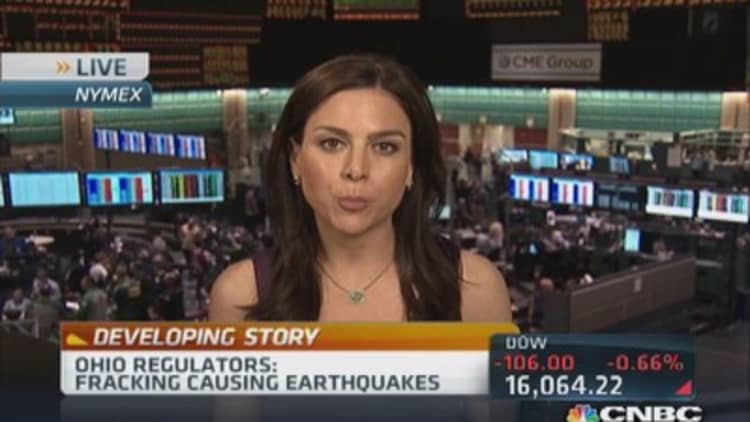A move by Ohio regulators last week to tighten permits around hydraulic fracturing—so-called fracking—could amplify the debate between energy industry interests and environmentalists over the gas drilling technique.
In a carefully worded decision Friday, Ohio's Department of Natural Resources for the first time drew a tentative link between gas drilling and an uptick in local quakes. Studies previously had linked only the disposal of fracking wastewater to earthquakes, not the act of fracking itself.
Read MoreOhio regulators halt fracking site, drawing link to quakes
New guidelines in the state will allow regulators to halt fracking if seismic monitors detect a quake in excess of 1.0 on the Richter scale, in order to investigate whether drilling is "the probable connection" to a potential quake.
A data point 'to be mindful of'
"While we can never be 100 percent sure that drilling activities are connected to a seismic event, caution dictates that we take these new steps to protect human health, safety and the environment," said the Ohio agency's director, James Zehringer, in a statement. The new policy "will provide more information" about the causes behind tremors in the region, he added.
For the moment, the jury is still out on how tight the link is between quakes and soaring shale production, and few think it will derail a U.S. drive toward energy independence that's built largely around fracking. However, the surge in seismic disturbances has left both sides of the fracking debate more polarized than ever.
Read MoreExxonMobil agrees to share more data on fracking risks
For their part, fracking advocates said the decision will do virtually nothing to alter the boom that has sent proven U.S. oil reserves to their highest since 1976.
"What Ohio is done is certainly not an indication that there's any danger," said Mike Krancer, a law partner in Blank Rome's energy practice, and Pennsylvania's former top environmental official.
"What they have indicated is that it's a data point and we need to be mindful of," he said. "There's a misread that there's a governmental agency arguing this poses a safety or danger issue. It does not."

Whatever its merits, Ohio's decision underscores the debate between environmentalists and oil producers.
A dramatic upswing in the number of earthquakes in the U.S. has coincided with the energy boom, giving fuel to conservationists who have warned about hydraulic fracturing's negative effects.
According to the U.S. Geological Survey, there were almost 450 recorded quakes of magnitude 3.0 or larger during 2010-2013, or more than 100 a year on average. That compares with an average of 20 per year in the preceding 30 years. Last month, the agency said a 5.7 earthquake in Oklahoma—near the epicenter of neighboring Texas' Eagle Ford shale drilling—in 2011 was "unintentionally human induced."
The wastewater effect
USGS researchers have been circumspect about the nature of the quakes. The agency recently said that fracking "is only very rarely the direct cause of felt earthquakes." However, government scientists have focused in on wastewater injection associated with fracking, with the process drawing more scrutiny as reports of earthquakes become more frequent.
Experts say those injection wells, a byproduct of shale drilling, are a growing issue that oil and gas producers need to address.
"The overall uptick in earthquakes in the continent seems related to wastewater," Katie Keranen, a geophysicist at Cornell University and a former ExxonMobil exploration scientist, explained in an interview.
Read MoreDemocrats to Obama: Make a call on Keystone
Drillers "end up with a high volume of wastewater and put it back into another formation, and that's what's more commonly linked to earthquakes," Keranen said.
Still, even staunch fracking opponents have stopped short of drawing an outright connection between drilling and quakes.
The National Resources Defense Council said that energy production "must not come at the expense of public health and safety," but recently acknowledged the need for more research and data into the subject.
"Rather than putting a damper on the boom, it will force a drive for new technology and operations and practices," said Keranen. "We have a need for energy, and if we are going to get it, we need to do it safely."
Correction: an earlier version of this story misidentified the shale formation nearest to Oklahoma.


